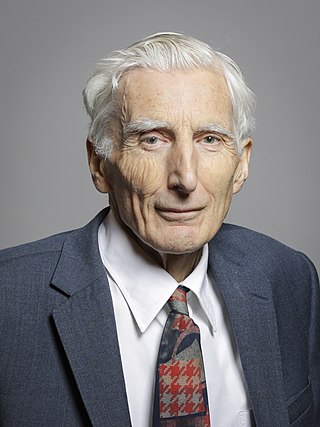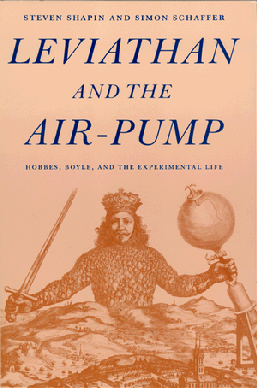
Thomas Hobbes was an English philosopher. Hobbes is best known for his 1651 book Leviathan, in which he expounds an influential formulation of social contract theory. In addition to political philosophy, Hobbes contributed to a diverse array of other fields, including history, jurisprudence, geometry, theology, and ethics, as well as philosophy in general. He is considered to be one of the founders of modern political philosophy.
Reproducibility, closely related to replicability and repeatability, is a major principle underpinning the scientific method. For the findings of a study to be reproducible means that results obtained by an experiment or an observational study or in a statistical analysis of a data set should be achieved again with a high degree of reliability when the study is replicated. There are different kinds of replication but typically replication studies involve different researchers using the same methodology. Only after one or several such successful replications should a result be recognized as scientific knowledge.

Robert Boyle was an Anglo-Irish natural philosopher, chemist, physicist, alchemist and inventor. Boyle is largely regarded today as the first modern chemist, and therefore one of the founders of modern chemistry, and one of the pioneers of modern experimental scientific method. He is best known for Boyle's law, which describes the inversely proportional relationship between the absolute pressure and volume of a gas, if the temperature is kept constant within a closed system. Among his works, The Sceptical Chymist is seen as a cornerstone book in the field of chemistry. He was a devout and pious Anglican and is noted for his writings in theology.

Simon Walter Blackburn is an English academic philosopher known for his work in metaethics, where he defends quasi-realism, and in the philosophy of language; more recently, he has gained a large general audience from his efforts to popularise philosophy. He has appeared in multiple episodes of the documentary series Closer to Truth. During his long career, he has taught at Oxford University, Cambridge University, and University of North Carolina, Chapel Hill.

Martin John Rees, Baron Rees of Ludlow, is a British cosmologist and astrophysicist. He is the fifteenth Astronomer Royal, appointed in 1995, and was Master of Trinity College, Cambridge, from 2004 to 2012 and President of the Royal Society between 2005 and 2010.

The sociology of scientific knowledge (SSK) is the study of science as a social activity, especially dealing with "the social conditions and effects of science, and with the social structures and processes of scientific activity." The sociology of scientific ignorance (SSI) is complementary to the sociology of scientific knowledge. For comparison, the sociology of knowledge studies the impact of human knowledge and the prevailing ideas on societies and relations between knowledge and the social context within which it arises.

Steven Shapin is an American historian and sociologist of science. He is the Franklin L. Ford Research Professor of the History of Science at Harvard University. He is considered one of the earliest scholars on the sociology of scientific knowledge, and is credited with creating new approaches. He has won many awards, including the 2014 George Sarton Medal of the History of Science Society for career contributions to the field.
In science studies, boundary-work comprises instances in which boundaries, demarcations, or other divisions between fields of knowledge are created, advocated, attacked, or reinforced. Such delineations often have high stakes involved for the participants, and carries with it the implication that such boundaries are flexible and socially constructed.
David Walter Runciman, 4th Viscount Runciman of Doxford, is an English academic and podcaster who teaches politics and history at Cambridge University, where he is Professor of Politics. From October 2014 to October 2018 he was also Head of the Department of Politics and International Studies.

Michael Cyril William Hunter is emeritus professor of history in the department of history, classics and archaeology and a fellow of Birkbeck, University of London. Hunter is interested in the culture of early modern England. He specialises in the history of science in seventeenth- and early eighteenth-century England, particularly the work of Robert Boyle. In Noel Malcolm's judgement, Hunter "has done more for Boyle studies than anyone before him ".
Robert Sharrock (1630–1684) was an English churchman and botanist. He is now known for The History of the Propagation and Improvement of Vegetables by the Concurrence of Art and Nature (1660), for philosophical work directed against Thomas Hobbes, and as an associate of Robert Boyle

The George Sarton Medal is the most prestigious award given by the History of Science Society. It has been awarded annually since 1955. It is awarded to an historian of science from the international community who became distinguished for "a lifetime of scholarly achievement" in the field.
John Mullan is a professor of English at University College London (UCL). He is a specialist in eighteenth-century literature, currently writing the 1709–1784 volume of the Oxford English Literary History.

Leviathan and the Air-Pump: Hobbes, Boyle, and the Experimental Life is a book by Steven Shapin and Simon Schaffer. It examines the debate between Robert Boyle and Thomas Hobbes over Boyle's air-pump experiments in the 1660s. In 2005, Shapin and Schaffer were awarded the Erasmus Prize for this work.
Glen Francis Newey was a political philosopher, last acting as a Professor of Practical Philosophy at the University of Leiden. He previously taught in Brussels at the Université Libre de Bruxelles and until 2011 was Professor in the School of Politics, International Relations & Philosophy at Keele University, Staffordshire, England. He was a prominent member of the "Realist" school of political philosophers which also includes such figures as Bernard Williams, John N. Gray, and Raymond Geuss. Newey also wrote extensively about toleration, casting doubt on whether it remains a coherent political ideal in modern liberal-democratic societies.

The Hobbes–Wallis controversy was a polemic debate that continued from the mid-1650s well into the 1670s, between the philosopher Thomas Hobbes and the mathematician and clergyman John Wallis. It was sparked by De corpore, a philosophical work by Hobbes in the general area of physics. The book contained not only a theory of mathematics subordinating it to geometry and geometry to kinematics, but a claimed proof of the squaring of the circle by Hobbes. While Hobbes retracted this particular proof, he returned to the topic with other attempted proofs. A pamphleteering exchange continued for decades. It drew in the newly formed Royal Society, and its experimental philosophy to which Hobbes was opposed.
Walter Warner (1563–1643) was an English mathematician and scientist.
William Anthony Harris FRS FMedSci is a Canadian-born neuroscientist, Professor of Anatomy at Cambridge University, and fellow of Clare College, Cambridge. He was head of the Department of Physiology, Development and Neuroscience since its formation in 2006 until his retirement in 2018.

Dr. Robert Fox MA, DPhil, FSA FRHistS is a leading British authority on the history of science. He is interested in the history of sciences and technology in Europe from the 18th century onwards. He has published extensively. His book The Savant and the State examines science, culture and politics in France between 1814 and 1914, while Science without Frontiers examines developments from the late nineteenth-century until the Second World War. In 2015, Fox received the George Sarton Medal, the premier award of the international History of Science Society (HSS). He was recognized as a Chevalier of the Ordre des Arts et des Lettres by France's Ministry of Culture in 2006.
Melissa Hines is a neuroscientist and Professor at the University of Cambridge. She studies the development of gender, with particular focus on how the interaction of prenatal and postnatal experience shape brain development and behavior.










